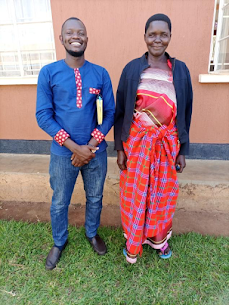By Shafic Mutegule
“I first got a miscarriage in 2017, and two miscarriages in 2018. These three miscarriages were fully managed by doctors through proper evacuation -- [the fourth] endangered my life.”
 |
Shafic and Joyce at Namungalwe Health Centre 3 |
“I was rushed to a nearby clinic in Namutumba Town [and] later on referred to Namutumba Health Facility. An evacuation was done by the doctor, and little did I know that my uterus was damaged during the evacuation process. I started feeling sick and [having] a lot of abdominal pains.”
After her dilation and evacuation (D&E), Joyce decided to return to the health facility for care and she was advised by the health worker that her uterus needed to be removed. While the operation was successful to fix her urgent health crisis, once home, she noticed that she was leaking urine.
This year, Joyce attended an event in Kavule organized by Uganda Village Project’s Fistula Ambassadors. Hearing her story, the ambassadors came to check on her at home. Upon seeing her condition they immediately referred her to Loy, UVP’s Reproductive Health Program Coordinator.
“I talked to Loy on [the] phone, [she] provided counseling and explained to me all the services that are provided by Uganda Village Project through the fistula program. This gave me some hope that I could get back to normal as I used to be.”
I first learned about Joyce during our regular Monday staff meeting when Loy shared her story. Inspired by her strength and resilience, I arranged a time to meet with Joyce before her surgery at Kamuli Mission Hospital.
We met at Namungalwe Health Centre 3 during the patient confirmation pre-screening. Despite her condition, she was so happy -- smiling and excited to be selected and confirmed among the fistula patients that were to receive treatment during the October surgery camp. I am grateful for the opportunity to have met her and learn about her life.
After pre-screening, UVP escorted Joyce and her caretaker to Kamuli Mission Hospital where she underwent her repair surgery. She is currently recovering safely, grateful that her suffering is finally over.
--
Learn more about UVP on our website and please consider supporting UVP with a monthly gift. We provide year-round programming and education for HIV/AIDS, clean water and sanitation, malaria prevention and treatment, reproductive health services, and fistula repair surgeries.















